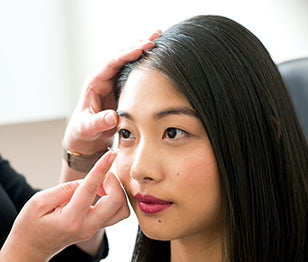The steps to getting the right contacts for you

If you think contact lenses might be a good fit, here are a few steps you’ll need to take to get the right match.
1. Book an eye test
Make an appointment with your optometrist, and chat to them about contact lenses. “Optometrists might focus on the various glasses options available to help you see better and might not include contact lenses as an option for vision correction,” says Bupa optometrist Karen Makin.
But it doesn’t mean you’re not suitable for them – in fact, most people who wear glasses can wear contacts so it’s good to discuss your options.
2. Do a trial
Once you’ve sorted out the lenses your optometrist has recommended, you’ll try them out for a short period to see how they go, how to clean and care for them and generally if you like them or not. Bupa Optometrists offer a free trial (but there may be a consultation charge).

“This trial gives you the opportunity to feel what contact lenses are like in your eye and to get used to them at work, at home, at sport and during all the other activities you normally do to see how they work for you,” says Makin.
It’s important to chat to your optometrist honestly about what you’re experiencing – you want to be comfortable! “Don’t just let things be. Generally speaking, we can do something that will make things better so you can enjoy the convenience of wearing contact lenses.”
“Sometimes people might come back and say, ‘They feel great, but I feel my vision could be a little bit better’. So we might need to tweak that. Or they might say, ‘My vision’s great, but they’re not as comfortable as I hoped they might be’. And we might need to tweak that. It might be a change of lens material, lens design or brand of contact lenses.”
If you’ve decided that contacts are the way to go, you’ll be able to buy 3-12 months’ supply. But don’t get rid of those specs just yet - “We always recommend having glasses as well,” says Makin.
Does Medicare cover contact lenses?
It’s not likely, but they may cover the consultation you have to get them.
“Medicare covers some contact lens consultations, but this is on a case-by-case basis and depends on the prescription,” says Makin. “It tends to cover higher prescriptions where the glasses are getting too thick and heavy.”
Your optometrist will be able to advise the costs involved once they have determined your prescription. This will help you make the right decision based on convenience, cost and your lifestyle.

We're here to help
Ask your optometrist if you have any questions about contact lenses or book a contact lens fit or refresh appointment today.
You might also like to read...
View all-
A little about Orthokeratology
Are you looking for a solution that doesn’t involve invasive procedures or surgery? Orthokeratology may be your answer…
Contact lenses guideA little about Orthokeratology
Are you looking for a solution that doesn’t involve invasive procedures or surgery? Orthokeratology may be your answer…
Read more -
Contact lenses 101: your need-to-know guide
How do teeny-tiny bits of plastic help you see better? Here’s an explainer on how contact lenses work.
Contact lenses guideContact lenses 101: your need-to-know guide
How do teeny-tiny bits of plastic help you see better? Here’s an explainer on how contact lenses work.
Read more -
Are contact lenses right for you?
Contact lenses are popular for a reason – they make life much easier for many people with vision issues. However, they might not be the right option for everyone.
Contact lenses guideAre contact lenses right for you?
Contact lenses are popular for a reason – they make life much easier for many people with vision issues. However, they might not be the right option for everyone.
Read more






